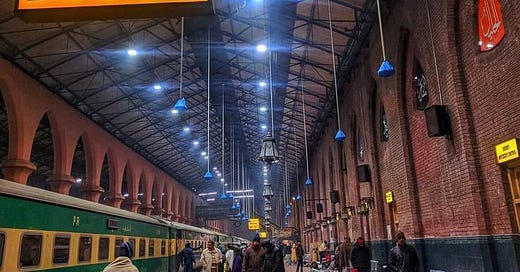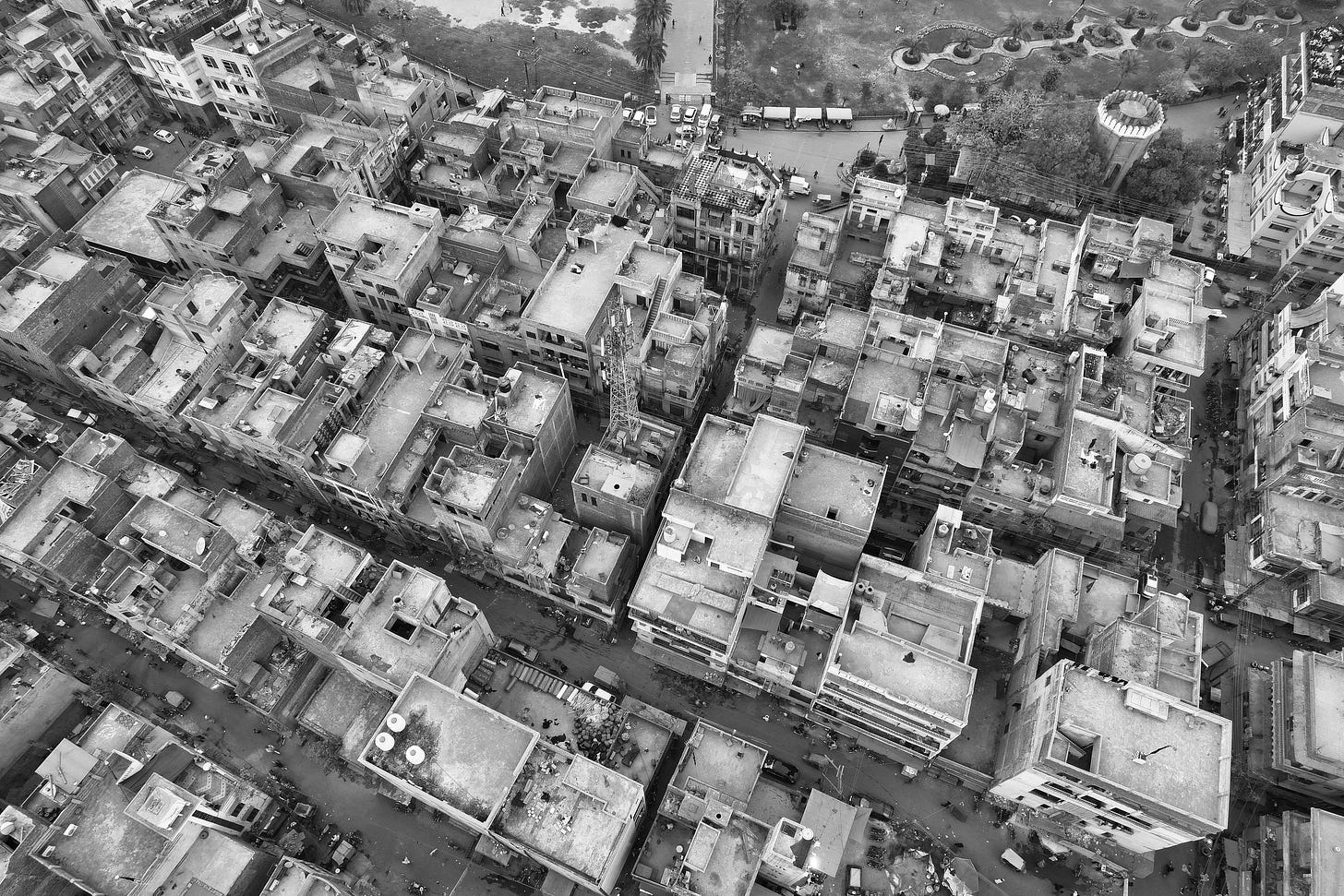A Broken Home, A Hostile Home, An Unsafe Home
A city isn't the same for everyone; the things that make home don't translate the same for everyone. Written by Noor Shahzad.
Leaving a broken home for a broken world.
Leaving a hostile home for a hostile world.
Leaving an unsafe home, an unsafe world.
If our homes were safe and stable would we still leave them to explore the prospects, opportunities of the world?
How do we navigate mobility and the relationship between home and the world when both seem ephemeral and unsafe, floating on murky waters.
My son just started school. He’s a well behaved boy in class, I am told by the teacher. But when he comes home it is utter chaos. The moment we get home he wants to jump on the sofas and the bed, scream and shout. This is his safe space and he is allowed to take as much as his heart desires.
Is it because I am in the thick of this season of motherhood that I see it reflected everywhere around me? I ask myself.
Perhaps.
The point remains: safety at home is associated with very, very small things. But at a larger scale, our home-land, this country we call our own, does not provide that safety to everyone.
Outside certain spaces, restaurants and others say ‘rights of entry reserved.’ You are not allowed here even if you are from this home. This immobility is reflected in other spaces as well. Our education system; 70% of our interviewees are high school dropouts. Within this home-land our schools are unsafe. Based on their behaviour at school, some were told to leave. You do not belong here.
Maybe you will find somewhere to belong in this big world.
Based on their behaviour on the streets of the said home-land, they were told to leave. Up to no good. Awara. Cricket with friends. I get it.
Productivity and income generation are important. So are safe avenues of fun, joy, and self expression, such as jumping on sofas and creating chaos.
Some left because there was not enough to eat at home, and then they had brothers and sisters who needed to be fed, and sheltered, and taken care of.
Remittances make up a huge part of this economy. Some leave so the rest of us can also stay afloat, and their brothers and sisters are clothed, and fed and taken care of.
We ask things of those who leave, such as why did you leave? What prompted the decision to leave through such unsafe routes and in such extreme ways? The counterpart needs to be weighed in about unruly hostile unsafe homes.
Those who are too masculine need to leave. The masculine figures that need adventure, and must provide needs to be outside the home in order to create provisions to run it. The space within the home for the masculine, for young children and the elderly, those between the ages of 14 to 45 able bodied men, need to leave for the world. There is pride in that departure.
It is August 14th. The part of Lahore that I live in is lit. There are green and white lights hanging from the walls of the underpass, and everywhere and anywhere you can see are lights. Each year the display is more ostentatious. As the economy crashes and we go through more difficult times, the display of patriotism on public holidays becomes more frothy and shiny. So much that at times it feels unbearable alongside it being distasteful.
There are people visiting the part of Lahore that I live in to see the lights and displays with their families, because the part of Lahore they live in is not lit in the same way or maybe not at all. Afterall, you can’t paint over a broken wall to make it look beautiful. You can paint over the walls that are standing but have weak foundations so they look clean, pristine, and presentable.
The guards are shooing away the people lounging under the star and moon lights. It is a hot humid night. The crescent and star can’t keep the sweltering heat away or provide any kind of shelter, but gleaming and glittering, the lights look beautiful. The person who had installed the lights had put some butterflies in too for extra effect, or maybe it was an inside joke we would never know.
My son now knows the flag, the star, and the moon wherever he sees it. He gets excited and giddy as we drive past billboards with the flag painted on them. “Look! Look! Star and moon,” he says. We drive past the lights in the comfort of our car. We don’t need to lounge under the lights to enjoy them.
The crowd on 14th August is always insane, we are told. The bikers. The one wheelers. For an old building with an open roof where certain parts of the building gets painted and polished on special occasions and put on display, it is unfair to assume that the residents of the said building will not enjoy the polished cleaned out parts and be in awe of its momentary beauty.
The guard is asking a man with a lit cigarette to leave who is casually sitting and ignoring the whistle. The guard is angry, rushing towards him. The small orange circle of the cigarette becomes more and more distant. The man rushes away on the motorcycle. Next morning, the lights are gone. Next evening, when we drive past the park there are no onlookers who had come to see the lights.
When we were little the light displays stayed for a few days.
We are editing a video for Instagram, and interviewing a film maker who works on Dunkee, the same week. He tells us of the time he spent on European borders with boys and men staying close to borders, further away from cities in order to cross over whenever they got the chance. In the clip for Instagram is a BBC interview of a former prime minister. ‘So many pakistanis are wanting to leave the country,’ the interviewer asks the prime minister. ‘So let them. Who is stopping them?’
In Bangladesh there is a student revolution. We see on TV screens people taking over the presidential house. Someone was taking a sari that belonged to Haseena Sahiba, three boys sleeping on a big bed that she must have slept in. The images are funny. The reality never is. Will they be put behind bars for taking the pink sari?
“Good riddance,” my ami says, “she never smiled in all these years. Must be constipated and have a bad gut.”
The idea that I am thinking of exploring is not necessarily leaving but going places that one is not allowed to go.
My professor wrote a book about the nation state. I remember all the lectures about politics and not understanding why I had to sit through those. They made absolutely no sense to me.
For a course, my groupmate and I went to interview partition survivors, she with her broken Urdu and I with my broken Punjabi. My nani drove us to her ancestral village and arranged for us to speak to her nanny who had been with the family from before Partition.
The small alleyways smelled of waste and the scent of masala being cooked. I could tell the distinct smells because that was the summer I learned how to cook. My nani’s maid Sughrah, her husband and their family, were incredibly gracious to us. We spent the day listening to her tell stories of her girlhood spent caring for my nani’s grandmother in Jalandhar.
N and I kept wanting to listen.
Not once did she comment on how abrupt our questions were, and how bad my Punjabi was. She was too bighearted. I felt like I had known her forever. With a bottle of achaar and interviews recorded on N’s Blackberry we left for Lahore with promises to come visit them again in our winter break.
That summer I learnt about the intimacy of death. My nani called one day and told me Sughrah was no more. I cried. She joked that it was probably my terrible Punjabi that saw the last of her. She cried remembering her.
Arshad Nadeem won a gold. We all felt proud. The memes were hilarious. His face is plastered all over the TV ads. Chopra, who is his Indian competitor who won silver, his mother comments that she feels like he, too, is her son. Arshad Nadeem is from Miyan Chanoo. I don’t know where it is. He beat the odds.
Maybe, he too, was shooed away from practices as well as from parks which were lit for the 14th of August. Today we celebrate his name and his resilience. The resilience of interviewees. There are many resilient ones that we don’t know of, and perhaps they don’t have to be so resilient.
Perhaps we can trade some of that resilience for empathy and we would all be better off.





